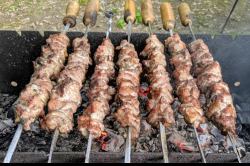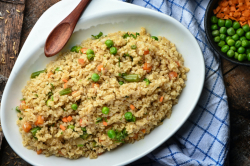The don’t-ever-do-it kind of advice
Here in Russia, we have such a thing as “вредные советы” (vrednyie sovety), which is devious advice. Originally, it is the title of a children’s book with advice on how (not) to behave, but it is also used colloquially to mean any kind of bad advice put in the respectable form of a good one. As in, “cross the street on the red light” or “the polite way is not to say thank you ever.”
Today, we have decided to accumulate our collective bad wisdom and share some widespread (un)healthy eating recommendations of rather questionable character that we all heard as kids from our grandparents, aunties, and on TV. Read at your leisure, but proceed with caution.
General “health”
- You absolutely have to eat soup every day. Otherwise, you will develop all sorts of serious stomach problems.
- Are you feeling unwell or just generally tired? Does your complexion leave much to be desired? Just spend a day fasting on pure kefir, it will fix you right up and get rid of all the junk you have accumulated in your body.
- Not a fan of kefir? Well, then try some phytotea (herbal tea) instead! Just do the same thing: no food and a cup of this brew instead of every meal.
Staying thin
- If you are looking to lose some weight, just hit the banya (Russian sauna) – and sweat it all off.
- Feeling hungry on a diet? Just trick your brain and stomach by chewing on some gum!
- Don’t forget, there are some negative-calorie products! Celery and pineapple, for instance, will help you eat without putting on any weight.
The main villains
- Never drink Coca-Cola – have you seen what it does to the scaling inside a kettle when boiled? It will dissolve your stomach just as easily!
- Whatever you do, avoid sugar and salt – both of them are “white deaths” and only evil can come from those.
- Moreover, sugar will give you acne! And who wants that?
Some actual, non-evil, wisdom
To counterbalance all the questionable advice from above and equip you with some more reliable information, we’ve reached out to Olesya Volokh, an associate professor at ITMO’s Faculty of Biotechnologies and head of the FoodTech Master’s program. Here are her tips:
- So as not to fall into the trap of healthy-eating myths, I would recommend turning to trusted sources, such as the WHO, or the Ministry of Health (in Russian).
- If you are following bloggers who make content on the topic, choose those who use the evidence-based approach.
- When turning to PubMed for info, remember to find a meta analysis on a particular issue because separate articles can have contradicting results.
- As an ITMO student, you can also sign up for the Nutrition course offered as part of the FoodTech Master’s program at the Faculty of Biotechnologies. There, you will discover the basics of nutrition science and a healthy diet, learn to read produce labels, bust common myths, as well as learn to apply all of this knowledge in your everyday life. To sign up for the course, reach out to Nadezhda Serova (serova@itmo.ru). Good luck on your journey and we will be happy to see you in class!
We hope you don't fall victim to any devious advice and stay healthy inside and out!




